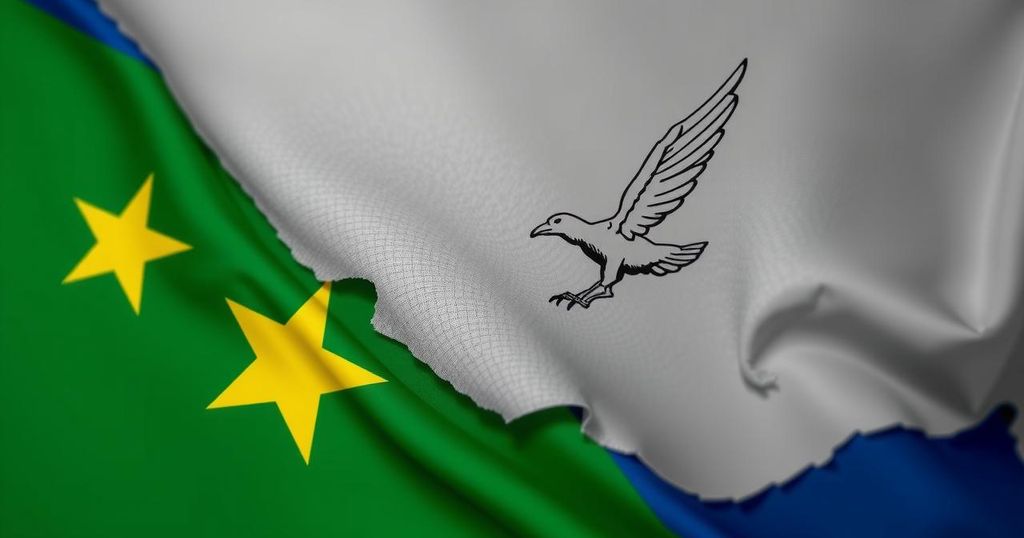Sudan’s Finance Minister, Gibril Ibrahim, has appealed to the U.S. to pressure the UAE to stop supporting the Rapid Support Forces (RSF), which are in conflict with Sudan’s army. He argues that Emirati support exacerbates violence, and he emphasizes the need for international aid to help rebuild the country amidst ongoing turmoil. Ibrahim secured significant funding during his trip to Washington for development projects in Sudan.
On November 15, 2024, Sudan’s Finance Minister, Gibril Ibrahim, made a public plea to the United States, urging the Biden administration to exert pressure on the United Arab Emirates (UAE) to cease its support for the paramilitary group known as the Rapid Support Forces (RSF). This group has been engaged in conflict with the Sudanese army in a power struggle since April. Ibrahim, who also leads the Justice and Equality Movement (JEM) allied with the Sudanese forces, emphasized that the Emirati backing is exacerbating the ongoing violence in the nation. During an exclusive interview with Sudan Tribune, Ibrahim articulated the hopes of the Sudanese populace for the U.S. to rectify the situation by restraining the UAE’s military support. He remarked, “The Sudanese people hope that the United States of America will restrain its ally, the UAE, from supporting the militia and stop it from killing innocent Sudanese,” asserting that the cessation of Emirati assistance would potentially lead to peace. Accusations have been leveled against the UAE regarding their provision of weaponry and resources to the RSF via routes through other African nations. These supplies are reported to flow into Sudan, heightening the scale of the conflict, which has already caused significant turmoil. While in Washington for discussions with the World Bank and the International Monetary Fund (IMF), Ibrahim also addressed concerns regarding perceived fragmentation within the Sudanese army and its allied forces. He dismissed such claims as unfounded, affirming the strong alliance between the army and rebel groups in their mutual goal to restore order. He acknowledged the anticipated demands for power sharing among various factions once hostilities cease, yet reassured that currently, “the movements and the army are one body in the battle for dignity,” stressing their collective duty to defeat rebellion and maintain national unity. Furthermore, Ibrahim stated that it is presently unfeasible to quantify the conflict’s damage comprehensively; however, he has requested assessments from the World Bank and other financial institutions to attract international aid for reconstruction efforts. On his visit, Ibrahim successfully obtained $253 million from the World Bank and $100 million from the African Development Bank for development initiatives aimed at revitalizing Sudan. He also engaged with the Sudanese diaspora located in Washington and New York, furthering discussions on assistance and cooperation during these turbulent times.
The ongoing conflict in Sudan, which erupted in April, primarily centers around the power struggle between the paramilitary Rapid Support Forces (RSF) and the national army. The RSF, historically rooted in Sudan’s tumultuous past, has become a formidable force with substantial backing from international allies, notably the UAE. The appeal to the U.S. comes amid accusations against the UAE of supplying arms that sustain the RSF, raising concerns regarding regional stability and humanitarian crises. Sudan’s leadership is now seeking international intervention to help restore peace and enable economic recovery amidst ongoing violence.
In conclusion, Sudan’s Finance Minister Gibril Ibrahim has called for U.S. intervention to curb UAE support for the RSF, emphasizing that such a move could pave the way for ending the violent conflict that has gripped the nation since April. His appeals highlight the strong connection between international support and internal stability, underlining the urgency for global stakeholders to reassess their roles in Sudan’s ongoing crisis. With critical funding secured for development projects, the focus remains on rebuilding the country while maintaining unity against the challenges of war.
Original Source: sudantribune.com






